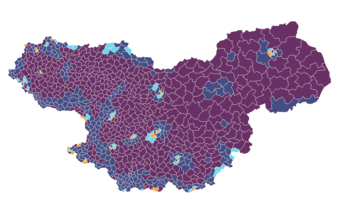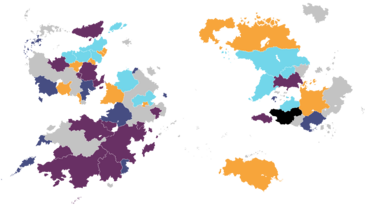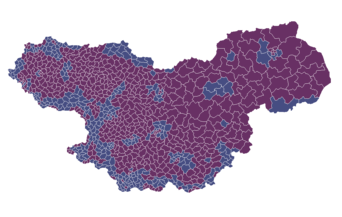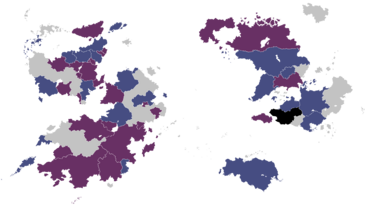Nimearian presidential election, 2018: Difference between revisions
m (1 revision imported) |
No edit summary |
||
| Line 1: | Line 1: | ||
{{medal}} | {{medal}}[[Category:Nimear]]{{Infobox election | ||
[[Category:Nimear]]{{Infobox election | |||
| election_name = Nimerian presidential election, 2018 | | election_name = Nimerian presidential election, 2018 | ||
| country = Nimear | | country = Nimear | ||
Latest revision as of 12:03, 30 March 2019
|-
| style="text-align:center;vertical-align:middle;" | || style="text-align:center;vertical-align:middle;" | {{{2}}}|| style="text-align:center;vertical-align:middle;" | {{{3}}}
| |||||||||||||
| Registered | 20,609,912 | ||||||||||||
|---|---|---|---|---|---|---|---|---|---|---|---|---|---|
| Turnout | 91.6% / 82.9% | ||||||||||||
| |||||||||||||
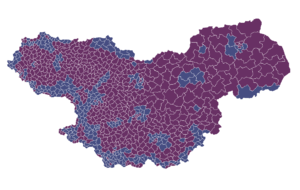 First-place candidate by district in the second round. | |||||||||||||
| |||||||||||||
The Nimearian presidential election of 2018 was held in two rounds on Sunday, July 15, 2018 and Friday, July 20, 2018 to elect a new State President. As no candidate won the necessary 50% of the vote in the first round the two most voted candidates - Mozes Koeaara of the Rainbow Coalition (who got 49.1% of the vote) and Krisje Buitink of the National Redemption Party (who got 37.3% of the vote) advanced to the second round. The election has been described as a realigning election.
Electoral process
Since the restoration of democracy in 1939 under the new post-war constitution, State Presidents are elected in a two-round system in which if a candidate does not achieve more than half of the vote in the first round the candidates with the two highest percentage of the vote will enter a second round. State President's serve for a four year term, and are eligible for re-election a further two times; former State President Lennaert Kruger is however ineligible due to his impeachment. Suffrage in Nimear is extended to all Nimearian citizens aged 18 or older. In most national elections, turnout averages between 60-80%.
To registrar to become a candidate for public office, there are certain requirements for nominees. The nominee needs to be a Nimearian citizen, to have had permanent residency in Nimear for the past five years, to have paid the necessary deposit and to have shown sufficient popular support by a recognised measure. People with dual citizenship are banned from running for public office.
Background
The Liberal Republican Party has led governing coalitions in Nimear since 1989, and State President Lennaert Kruger has served since 2012. Kruger was halfway through his second four-year term when independent socialist backbencher Mozes Koeaara put forward a private member's bill, which became known as the land reform bill, which was designed to redistribute agricultural land across the country, following a report that found disparity in land ownership across the population. Kruger, following the urging of Chancellor Willem Marsch, triggered article 18 of the Nimearian constitution and utilised his power to veto the bill before voting could commence, arguing that due the possibility of the bill having a detrimental effect on Nimearian race relations, it was in violation of the 1987 Aslpaat Act.
Koeaara, with the support of a number of other independents, successfully lobbied for a legal challenge to Kruger's usage of article 18, arguing it to be unconstitutional and an overreach of presidential power. With support from opposition parties and independent lawyers, Koeaara spearheaded the legal challenge in the Nimearian courts, which eventually found State President Kruger guilty of a misuse of presidential power, deeming the bill in question not to directly violate the 1987 Aslpaat Act, and that Kruger had opposed the bill on political grounds alone, utilising Marsch's urgings as proof of this fact. Following this, Lennaert Kruger was impeached, and officially expunged from his position as State President. His secretary, Valerie Kraasenberg, was appointed as interim-State President following a unanimous vote in the States General. On the 14th of June, she called the presidential election to determine Kruger's elected successor.
Candidates
The deadline for candidates to apply for the ballot paper ended on the 20th June. Seven candidates - Valerie Kraasenberg, Mozes Koeaara, Valentijn Hoofer, Krisje Buitink, Justin Otten, Roelof Dam Wiechers and Matthias Beauvais - paid the necessary deposit and showed sufficient support to apply for a candidacy.
| Candidate name and age political party |
Slogan | Political office(s) | Details | ||
|---|---|---|---|---|---|
| Valerie Krassenberg (78) Liberal Republican Party (Alliance for Freedom) |

|
Integriteit, Ervaring, Eerlijkheid - Krassenberg Integrity, Experience, Honesty - Krassenberg |
Secretary to the State President (2016-2018) Deputy President of the Liberal Republican Party (2008-2012) |
Former Secretary to State President Lennaert Kruger, Valerie Krassenberg was the acting interim-State President at the onset of the election. Krassenberg offers a programme of centre-right politics, which would involve a continuation of budget cuts to accommodate Nimearian debt, and further market liberalisation. Krassenberg noted personal opposition to land reform during the campaign. | |
| Mozes Koeaara (58) Independent Socialist (Rainbow Coalition) |

|
Deel ons Land, in Vrede en Diversiteit Share our Land, in Peace and Diversity |
Member of the States General (since 2001) Leader of the Rainbow Coalition (since 2018) |
Mozes Koeaara authored and sponsored the Land Reform Bill that started the crisis which led to the election; on a message of "land, peace and diversity", he has risen in the polls. His programme focuses on land reform to poorer and ethnic Nimearians, and an end the country's vast racial and economic divides. Considered a left-wing populist, Koeaara has been noted for his similarity to Lorenzo Occhetto of Marirana. He is strongly committed to land reform. If elected, would be the first Amaru native to hold the position. | |
| Valentijn Hoofer (49) Social Democratic Union (Movement for Renewal) |

|
Het Thuisland Vernieuwen Renewing the Homeland |
Leader of the Social Democratic Union (2008) Deputy Leader of the Social Democratic Union (2007-2009) |
Former interim leader and deputy leader of the Social Democratic Union, Valentijn Hoofer comes from a long line of Asterianer politicians, and is considered a neoliberal centrist candidate. He supports widespread social reforms, but no economic reforms to speak of. He is opposed to land reform. | |
| Krisje Buitink (51) National Redemption Party (Together for Nimear!) |

|
Nijmeer Verdient Beter Nimear Deserves Better |
Member of the States General (since 2007) Leader of the National Redemption Party (since 1988) |
Engaging in a nationalistic and right-wing populist approach, Buitink engineered herself as an opposition candidate who will work for all of Nimear. She supports socially conservative policies, with a Souverainist attitude to economics. She is in favour of land reform, but only on a non-racial basis. | |
| Justen Otten (39) Salvationist Front |

|
Een Idee Leeft voor Altijd An Idea Lives Forever |
Member of the States General (since 2011) Brotherly Guide of the Salvationist Front (since 1999) |
Otten has run for the presidency on behalf of the Salvationist Front in every election since 1999. He offers a Zwarter-focused platform; the only candidate to do so, and in fact the only ethnic Zwarter among the candidates. He supports a socially conservative, black nationalist outlook, with elements of left economics. He is in favour of land reform. | |
| Roelof Dam Wiechers (63) Communist Party |

|
Arbeiders, Verenigt! Workers, Unite! |
Member of the States General (since 2007) General Secretary of the Communist Party (since 2011) |
R.D Wiechers, General Secretary of the Communist Party, ran on an orthodox Mohrist communist ticket. He supports socially netural policies, and heavily leftist economic reform. He is in favour of land reform. | |
| Matthias Beauvais (72) Independent |

|
Gewoon de Beste Simply the Best |
CEO of the Beauvais Corporation (since 1972) |
Originally running for the Liberal Republican candidacy, Beauvais - CEO of the Beauvais Corporation - ran instead on an independent ticket, espousing a socially liberal platform committed to market privatisation. Beauvais made no comment on land reform. | |
Primaries
Liberal Republican Party
The Liberal Republicans are known not to utilise a primary system; instead, the candidate is agreed upon by high-ranking members in a number of closed-doors meetings. In a complex tradition dating back to the party's founding in 1792, prospective nominees makes themselves known by entering the meeting room with four contemporaries who can vouch for them, and declaring "Hier Sta Ik" ("Here I Stand"). The party's most prominent members then debate the matter, until eventually coming to a consensus, announcing the presidential candidate the next day. The system has been heavily criticised for it's inherently undemocratic nature, but remains in place - according to the party's leadership - due to the fact that it represents the party's "colourful history".
Four candidates made their nominations known via the traditional method; interim-State President Valerie Krassenberg, prominent thinker Oedipus Zallandt, Member of the States General Arjan Bloemenda and independent CEO Matthias Beauvais. Krassenberg was seen as a candidate for the status quo, while Zallandt was seen as a far more authoritative and right-wing thinker. The moderate wing of the party supported both Bloemenda, who was seen as more pragmatic and socially liberal, and Beauvais, who was seen as economically competent, as candidates. Ultimately, Krassenberg was officially endorsed by the LRP on the 16th of June; Beauvais would go on to support his own candidacy, and Zallandt would lead the Authentic LRP in supporting Krisje Buitink.
Social Democratic Union
| ||||||||||||||
| ||||||||||||||
The Social Democratic Union has used a closed primary across the seven provinces since it's foundation. The candidate for the presidency is decided by a two round race, between the two primary candidates who gathered the most support. The SDU's candidate for State President is the candidate who gains more than 50% of the votes in the second round of voting; if 50% is not secured, the process repeats.
On this occasion, there was no need for a second round, as the primary had only two candidates. Former deputy and interim leader Valentijn Hoofer, widely considered the candidate of the party establishment and the neoliberal centre, and professor of politics Thea Zonnenberg, representing the party's remaining left-wing faction. Hoofer secured the party nomination with a strong 61% of the vote.
Rainbow Coalition
The Rainbow Coalition stated in it's founding document that it will utilise an open primary system, however, the first motion passed by the Coalition was to unanimously support Mozes Koeaara in his candidacy for the presidency. This is of little surprise, as the party was essentially founded to support Koeaara's candidacy. Polling suggested that 89% of Rainbow Coalition members agreed with the decision to support Koeaara. The party's General Secretary, Eliza Arendsman, defended the decision. She argued that the lack of a primary gave the party more time to campaign on Koeaara's behalf. The party will utilise primaries in the future.
National Redemption Party
The National Redemption Party does not utilise a primary system; the party's influential 1939 Conference instead votes on a candidate to represent the party. Since her ascension to the party leadership in 1988, Buitink has successively been appointed the party's nominee. Buitink announced her candidacy on behalf of the NRP not long after the election announcement.
Other parties
Three other candidates aid the necessary deposit and showed sufficient support to run for the presidency - Brotherly Guide of the Salvationist Front and States General member Justen Otten, General Secretary of the Communist Party of Nimear and States General member Roelof Dam Wiechers, and CEO Matthias Beauvais. Otten ran on a Zwarter-focused ticket, Wiechers on a traditional Mohrist platform, and Beauvais on a pro-market programme.
Opinion polls
First round

| Date | Institute | Valerie Krassenberg |
Mozes Koeaara |
Valentijn Hoofer |
Krisje Buitink |
Justen Otten |
R.D. Wiechers |
Matthias Beauvais |
Other or no answer |
Lead |
|---|---|---|---|---|---|---|---|---|---|---|
| End of public opinion polling (14/07/2018) | ||||||||||
| 14/07/2018 | de Heraut | 7% | 45% | 7% | 34% | 2% | 2% | 2% | 1% | 11% |
| 12/07/2018 | Enquête | 8% | 43% | 8% | 36% | 2% | 1% | 1% | 1% | 7% |
| 11/07/2018 | de Heraut | 8% | 38% | 7% | 39% | 3% | 2% | 2% | 1% | 1% |
| 10/07/2018 | Upsos Mouri | 10% | 38% | 8% | 36% | 4% | 1% | 1% | 1% | 2% |
| 8/07/2018 | SurPoll | 22% | 29% | 10% | 30% | 3% | 1% | 1% | 4% | 1% |
| 6/07/2018 | de Arbeider | 10% | 51% | 4% | 28% | 1% | 2% | 2% | 2% | 23% |
| 3/07/2018 | Enquête | 12% | 40% | 4% | 39% | 1% | 1% | 1% | 2% | 7% |
| 1/07/2018 | de Heraut | 18% | 34% | 8% | 27% | 2% | 2% | 3% | 6% | 7% |
| 30/06/2018 | Grotetwee | 20% | 43% | N/A | N/A | N/A | N/A | N/A | 37% | 23% |
| 30/06/2018 | SurPoll | 27% | 26% | 9% | 26% | 6% | 1% | 1% | 2% | 1% |
| 29/06/2018 | Grotevier | 27% | 44% | 20% | 28% | N/A | N/A | N/A | 11% | 16% |
| 28/06/2018 | Upsos Mouri | 28% | 29% | 3% | 28% | 4% | 1% | 4% | 2% | 1% |
| 26/06/2018 | de Arbeider | 26% | 43% | 5% | 21% | 1% | 1% | 1% | 2% | 17% |
| 25/06/2018 | de Heraut | 38% | 32% | 5% | 20% | 2% | 1% | 1% | 1% | 6% |
| 24/06/2018 | de Heraut | 30% | 42% | 6% | 14% | 3% | 1% | 1% | 3% | 12% |
| 21/06/2018 | SurPoll | 35% | 39% | 8% | 10% | 3% | 1% | 1% | 4% | 4% |
| 19/06/2018 | Upsos Mouri | 38% | 37% | 9% | 9% | 4% | 1% | 1% | 1% | 1% |
Second round

| Date | Institute | Mozes Koeaara |
Krisje Buitink |
Lead | ||||||
|---|---|---|---|---|---|---|---|---|---|---|
| End of public opinion polling (19/07/2018) | ||||||||||
| 19/07/2018 | de Heraut | 69% | 31% | 38% | ||||||
| 18/07/2018 | Enquête | 67% | 33% | 34% | ||||||
| 18/07/2018 | de Arbeider | 71% | 29% | 42% | ||||||
| 17/07/2018 | Upsos Mouri | 58% | 42% | 16% | ||||||
| 16/07/2018 | de Heraut | 49% | 51% | 2% | ||||||
| 16/07/2018 | Grotetwee | 62% | 38% | 24% | ||||||
| 15/07/2018 | SurPoll | 64% | 36% | 28% | ||||||
Campaign
Results
| Candidate | Party | First round | Second round | |||
|---|---|---|---|---|---|---|
| Votes | % | Votes | % | |||
| Mozes Koeaara | Independent Socialist (Rainbow Alliance) | 9,269,431 | 49.1% | 11,549,877 | 67.6% | |
| Krisje Buitink | National Redemption Party (Together for Nimear!) | 7,041,747 | 37.3% | 5,535,740 | 32.4% | |
| Valerie Krassenberg | Liberal Republican Party (Alliance for Freedom) | 981,691 | 5.2% | |||
| Valentijn Hoofer | Social Democratic Union (Movement for Renewal) | 774,026 | 4.1% | |||
| Justen Otten | Salvationist Front | 302,059 | 1.6% | |||
| Roelof Dam Wiechers | Communist Party of Nimear | 151,029 | 0.8% | |||
| Matthias Beauvais | Independent | 132,151 | 0.7% | |||
| Valid votes | 18,652,135 | 98.8% | 17,085,617 | 90.6% | ||
| Invalid/blank votes | 226,544 | 1.2% | 1,606,048 | 9.4% | ||
| Total | 18,878,679 | - | 18,691,665 | - | ||
| Registered voters/turnout | 20,609,912 | 91.6% | 20,609,912 | 82.9% | ||
Reactions
Domestic
- Mozes Koeaara thanked his campaign team for their "superb work during the election".
- Chancellor Willem Marsch said that the results were "disappointing", but that he "hopes the new State President maintains a working relationship with him".
- Valentijn Hoofer chastised the electorate as "unwilling to see reason", and signaled political retirement.
- Following her defeat, Krisje Buitink said she hoped that Koeaara would "ensure the Nimearian government works for it's people, not the other way around".
- Former interim-State President and candidate Valerie Krassenberg has stated that she "hopes he governs in the national interest".
International
 Glytter - The Foreign Ministry released a statement congratulating Koeaara on his victory, but urged government officials "avoid the use of polarised rhetoric" and stated its hope for a "period of co-habitation" within the government. Taoiseach Frank Casarnach congratulated Koeaara in a tweet, urging him to chart a course "independent of Jackson".
Glytter - The Foreign Ministry released a statement congratulating Koeaara on his victory, but urged government officials "avoid the use of polarised rhetoric" and stated its hope for a "period of co-habitation" within the government. Taoiseach Frank Casarnach congratulated Koeaara in a tweet, urging him to chart a course "independent of Jackson".
Analysis
Influential political analyst, Twan Bekhuis, claimed that the polarisation of Nimearian politics during the election was "clear from the outset", noting that people were "angry with the status quo", and that "a quick walk through the slums of Sint-Nicolaas will show you that".





